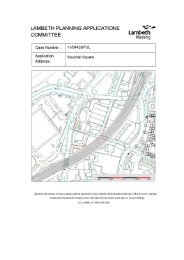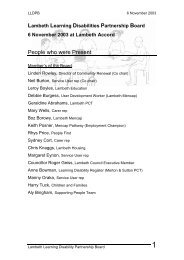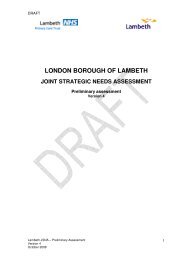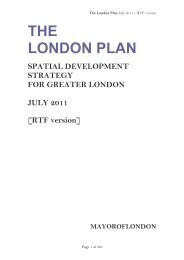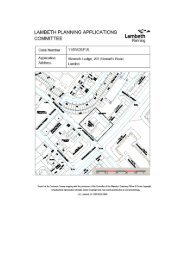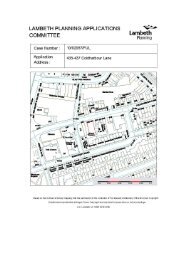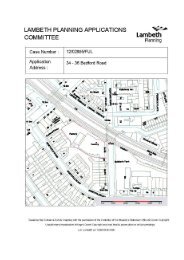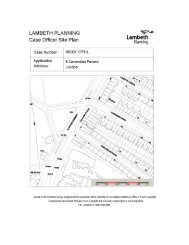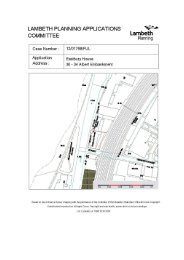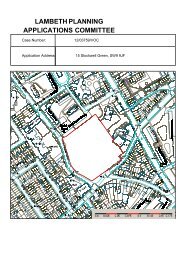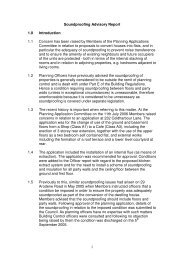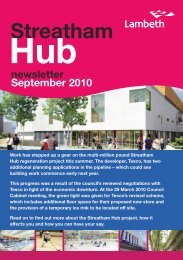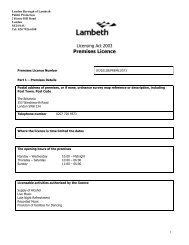Corporate Plan 2012 - 2015 - Lambeth Council
Corporate Plan 2012 - 2015 - Lambeth Council
Corporate Plan 2012 - 2015 - Lambeth Council
You also want an ePaper? Increase the reach of your titles
YUMPU automatically turns print PDFs into web optimized ePapers that Google loves.
Contents<br />
3 Our aspirations for <strong>Lambeth</strong><br />
5 Becoming a Cooperative <strong>Council</strong><br />
7 Our priorities <strong>2012</strong> – <strong>2015</strong><br />
8 Outcomes and key performance indicators <strong>2012</strong> – 15<br />
14 Our transformation journey<br />
Appendices<br />
16 Appendix one: Citizen Priorities<br />
17 Appendix two: Key Cooperative <strong>Council</strong> Transformational Activities<br />
19 Appendix three: <strong>Lambeth</strong> <strong>Council</strong>’s Revenue and Capital Budgets for <strong>2012</strong> – 15<br />
2
Our aspirations for <strong>Lambeth</strong><br />
<strong>Lambeth</strong> is one of the most diverse places in the UK and Europe. In a very real sense it is “the world in one borough”. It is important that every<br />
community feels at home here, secure both in their separate identity and also as part of <strong>Lambeth</strong> as a whole. Underpinning this is the belief that<br />
<strong>Lambeth</strong> <strong>Council</strong> must work, in a cooperative fashion, with all its communities to ensure their ambitions are met because no single model of service<br />
provision can possibly meet such a complex patchwork of needs.<br />
Through this cooperative endeavour, working together with the borough's citizens, <strong>Lambeth</strong> seeks to realise its goals to create a fair and socially<br />
just borough which is:<br />
caring<br />
aspirational<br />
safe and secure<br />
A caring borough<br />
<strong>Lambeth</strong> believes that the true measure of a community is the way it treats its most disadvantaged and vulnerable citizens (such as families on very<br />
low incomes, the elderly, those with disabilities or poor physical or mental health). <strong>Lambeth</strong> is clear that these groups cannot be left behind and<br />
must be given the chance to set and achieve their own aspirations, drawing on the resources London has to offer as a major world city. As a<br />
progressive borough, <strong>Lambeth</strong> believes that the most effective way to care for these citizens is to improve the outcomes achieved by our poorest<br />
and most vulnerable communities so they are closer to those achieved by the most affluent. At a time of shrinking resources, this will be achieved<br />
by moving away from universal services that are open to all towards targeted services that support those citizens in greatest need.<br />
As a result of this targeted work aimed at preventing social disadvantage we want to see a reduction in income inequality between the poorest and<br />
most affluent in the borough, support for our most vulnerable families, and the provision of a range of preventative health and social care services to<br />
enable citizens to lead healthy and active lifestyles.<br />
As well as improving the life chances of our citizens the council must also continue to be the champion for all people in <strong>Lambeth</strong>, including our<br />
employees – but in particular, seeking to ensure that our most vulnerable residents are protected from the effects of public sector cuts. We will<br />
achieve this by ensuring the voices of our residents and communities are heard by central government, working with other elected representatives<br />
to ensure <strong>Lambeth</strong> is not disadvantaged by national policy decisions, and through pro-active lobbying of central and regional government both<br />
directly and through organisations such as London <strong>Council</strong>s and the Local Government Association (LGA).<br />
3
An aspirational borough<br />
We want people to feel proud to live in <strong>Lambeth</strong>. It is a diverse, aspirational borough and we are driven by the desire to see everyone take<br />
advantage of the opportunities that are available as a result of living in central London. <strong>Lambeth</strong> will ensure high quality education and support for<br />
every young person, from early years right through to further and higher education, to guarantee every young person is given the best start in life.<br />
Caring for the vulnerable and narrowing income inequality underpin our desire for fairness, but <strong>Lambeth</strong> must also be a place where our citizens are<br />
supported to realise their ambitions. In particular, we want to ensure people are able to live in decent homes, can get a job with good prospects,<br />
have access to world-class education in good schools and colleges, and can enjoy a clean, green and sustainable environment. We also want to<br />
help our citizens prosper economically, and aim to promote enterprise and entrepreneurship within a strong and diverse local economy. We can<br />
help start-up businesses and social enterprises to take root and grow, we believe there is a particular opportunity for growth in the cultural, creative<br />
and green industries, and we believe we can stimulate entrepreneurship by including a wider range of organisations in delivering public services.<br />
All of this will generate more and better job opportunities for local people and attract investment into our borough.<br />
A safe and secure borough<br />
<strong>Lambeth</strong>'s communities must feel safe with falling rates of crime and anti-social behaviour and a visible police presence fighting crime within our<br />
neighbourhoods. We also want residents to feel secure in their homes, families and jobs, and secure financially. With such a diverse population,<br />
community cohesion is important, with communities confident both in themselves and integrated as part of the wider borough. People from different<br />
backgrounds, class and communities must feel at ease mixing with one another and working together to improve their local neighbourhood. Local<br />
culture, arts and sports opportunities should provide yet further opportunities to bring <strong>Lambeth</strong>'s communities together.<br />
The increasing pace of change, movement towards Big Society, the advent of Localism Act combined with cuts to public funding signalled the need<br />
to develop new ways delivering services. The Cooperative <strong>Council</strong> is about changing the relationship between citizens of <strong>Lambeth</strong> and the council<br />
and turning the way the council provides services on its head to find better ways to meet the needs of local citizens which are inclusive and<br />
empowering with an emphasis on sharing power and are outlined in Sharing Power: A new settlement between citizens and the state. In advocating<br />
this fundamental change to public service delivery <strong>Lambeth</strong> has rejected the suggestion that the state should simply withdraw from delivering public<br />
services. We want to change the role of the state not roll back the state. Our proposals are about guaranteeing the long-term survival of more<br />
responsive public services over alternatives such as privatisation, while at the same time building stronger communities in charge of their own<br />
destinies. At its core the Cooperative <strong>Council</strong> is about making real the time-honoured democratic ambition of handing ‘power to the people’.<br />
Cllr. Steve Reed<br />
Leader of the <strong>Council</strong><br />
4
Becoming a Cooperative <strong>Council</strong><br />
We intend to realise the ambitions set out by our Cabinet through becoming a Cooperative <strong>Council</strong>, guided by the principles and recommendations<br />
set out by the Cooperative <strong>Council</strong> Citizens’ Commission in “Sharing Power: A new settlement between citizens and the state”.<br />
The Cooperative <strong>Council</strong> draws inspiration from the values of fairness, accountability and responsibility that have driven public service in this<br />
country for centuries. It is about putting the resources of the state at the disposal of citizens so that they can take control of both services and the<br />
places in which they live. It is about finding new ways in which citizens can participate in the decisions that affect their lives.<br />
The practical application of the cooperative principles to council services will result in different outcomes, but certain themes will be shared by all:<br />
Co-production – valuing the contribution of service users and service professionals as equals in the design and delivery of public services.<br />
Through this partnership the services that are produced are more likely to meet the needs of citizens enabling citizens and professionals to<br />
learn, share and reflect the innovation and expertise that each can offer. There are already examples of co-production in council services<br />
such as the development of facilities and support for the Portuguese community in the north of the borough, and West Norwood Feast where<br />
local residents and businesses are working together to run market events in the town centre to bring more people and trade to the area.<br />
The principles of cooperatives and mutualism – emphasising the values of equitable relationships and shared power; providing the<br />
opportunity to introduce alternative ownership models for some council services where control is passed to community organisations and<br />
social enterprises. If organisations that are owned and run by the local community have ownership of the service, this will give them a much<br />
greater voice in the design and delivery of those services. In <strong>2012</strong> we plan to have developed new ownership models for 24 youth centres,<br />
adventure playgrounds and One O’Clock clubs through a community-led organisation, and transferred ownership of the <strong>Lambeth</strong> Resource<br />
Centre to a service user and staff led social enterprise.<br />
Community-led commissioning – our aim is for local communities to work together to assess the needs and assets in their neighbourhood,<br />
ensuring that localised commissioning plans are centred around local analysis, matching council resources with those from the local<br />
community. Pilot projects are beginning in four neighbourhoods working with four council services: in Stockwell, Herne Hill, South Bank and<br />
Loughborough Junction.<br />
While our Cooperative <strong>Council</strong> ambitions are at the heart of our corporate plan we recognise that we are operating within a context of significantly<br />
reduced public sector funding. This means that we will have to work in partnership with our citizens and customers to make tough decisions about<br />
how best to prioritise our resources. The most effective way in which to achieve these aspirations is to focus our efforts and resources on services<br />
that are targeted at those who most need them, which stop or reduce the likelihood of long term negative outcomes. Currently <strong>Lambeth</strong> <strong>Council</strong><br />
provides a wide range of these preventative services; however for the most part our resources continue to deal with the effects of negative<br />
outcomes rather than preventing them. This corporate plan continues the shift in our approach with targeted prevention becoming the dominant type<br />
of service.<br />
5
The corporate plan sits at the heart of the council’s activities, holding our work together. It is used to inform departmental action plans, service plans<br />
and individual objectives through the direction that it sets in the outcomes articulated as being our priority areas of focus. We should see a “golden<br />
thread” connecting the work that we all do back to these outcomes and overarching vision.<br />
Delivering the cooperative council is a significant challenge in itself, but doing so at a time of reduced funding and the uncertainty that this brings<br />
makes our task even greater. But work is already underway and there are many examples of cooperative working across the organisation that we<br />
must learn from and build upon as we work towards becoming a cooperative council by 2014.<br />
Derrick Anderson<br />
Chief Executive<br />
6
Our priorities <strong>2012</strong> – <strong>2015</strong><br />
This plan sets out Cabinet’s aspirations for the next three years through the delivery of three key priorities (a caring borough, an aspirational<br />
borough and a safe and secure borough). It describes the outcomes we will deliver as an organisation to meet these aspirations and how we will<br />
transform our ways of working to improve services and meet the financial challenges facing local authorities by becoming a cooperative council and<br />
increasing our preventative and targeted services.<br />
Part of our journey to becoming a cooperative council is to further acknowledge that council services are not the single or always the most important<br />
means of making a difference in our communities. At their best our services work with active and committed citizens, local neighbourhoods, citizen<br />
groups and associations, voluntary and community sector services, local businesses and other public services. Our outcomes framework describes<br />
what the council will contribute to the combined efforts of many people in <strong>Lambeth</strong> but we know that the more we work cooperatively with our<br />
communities the more we can all deliver for <strong>Lambeth</strong>. Working together we will be able to meet and exceed the aspirations set out by Cabinet, and<br />
the individual aspirations of our citizens and communities.<br />
Our outcomes focus on where the council can make the biggest difference. This tight focus has been developed through a deep understanding of<br />
citizen priorities (see appendix one for more details on our resident priorities) and a clear political vision from our administration. It means as an<br />
organisation we are clear about what we are trying to achieve and how we intend to achieve it within a context of significantly reduced resources<br />
across the public sector. The diagram on the next page illustrates our approach. Each of our priorities and outcomes includes our equality<br />
objectives. 1<br />
Our transformation priorities, to become a cooperative council and deliver more preventative and targeted services, are central to the delivery of our<br />
outcomes and therefore all the services we provide and our transformation will be at the heart of all service delivery.<br />
The role of our <strong>Corporate</strong> <strong>Plan</strong><br />
The corporate plan provides the framework through which the council prioritises resources and the plan drives all the services we provide to<br />
<strong>Lambeth</strong> residents. The service plans and activities of council departments, teams and individual members of staff are directed by the corporate<br />
plan, with all our activities designed to deliver our outcomes and our transformation priorities, or help our staff and partners to do this through<br />
providing high quality cooperative support services.<br />
1 The equality objectives set out here are those required by the Public Sector Equality Duty within the Equality Act (2010), following the incorporation of our Single<br />
Equalities Scheme into the <strong>Corporate</strong> <strong>Plan</strong> in 2011.<br />
7
Key performance indicators for <strong>2012</strong> – <strong>2015</strong><br />
It is vital that we are clear about how we intend to track our performance and drive forward our ambitions. Set out below are high level performance<br />
measures against which we will be tracking our improvement each quarter and beneath these, sit our service performance measures which will<br />
track how we are delivering for our customers.<br />
Each of our priorities and outcomes includes our equality objectives, following the incorporation of our Single Equalities Scheme into the <strong>Corporate</strong><br />
<strong>Plan</strong> in 2011. Within each outcome there are areas of inequality that we have identified through analysis of need, demographic data or resident<br />
concerns. In doing this we are ensuring that our equalities work is not an add-on, but an integrated part of how we deliver services and meet the<br />
needs of our residents.<br />
Outcome High level measures Equality priorities Indicators<br />
More vulnerable and<br />
disadvantaged residents are<br />
able to live independently and<br />
as they choose<br />
Communities feel secure<br />
There are positive impacts from<br />
services for elderly, disabled<br />
residents and their carers<br />
Social and financial inclusion is<br />
increasing<br />
Adult safeguarding is secured<br />
Families are supported<br />
Resident perceptions of the<br />
borough’s cultural offer are<br />
improving<br />
Residents feel different<br />
communities get on well together<br />
Residents feel that diversity is<br />
valued<br />
Increased in independent living for<br />
disabled people, residents over<br />
the age of 65 and financially<br />
disadvantaged residents through<br />
care services and personalisation<br />
Increased access and satisfaction<br />
of cultural services by all ethnic<br />
groups, for disadvantaged<br />
residents and for residents of<br />
different faiths<br />
Access to cultural services for<br />
disabled people and older people<br />
A reduction in discrimination felt<br />
Proportion of people using social<br />
care who receive self directed<br />
support<br />
Older people helped to live at home<br />
The percentage of social care clients<br />
reporting that services have<br />
increased the overall control they<br />
have over their daily life and their<br />
quality of life<br />
Permanent admissions to residential<br />
and nursing care homes<br />
Number of safeguarding adults<br />
referrals per month that are repeat<br />
referrals<br />
Resident perceptions of their<br />
personal financial circumstances<br />
The rate of child poverty in <strong>Lambeth</strong><br />
The average time to process<br />
benefits payments<br />
Number of homelessness prevention<br />
cases dealt with<br />
Resident perception of <strong>Lambeth</strong> as a<br />
place where people from different<br />
backgrounds get on well together<br />
Resident perception that in <strong>Lambeth</strong><br />
people are able to go about their<br />
daily activities without fear of<br />
discrimination<br />
Resident perception that <strong>Lambeth</strong><br />
9
Outcome High level measures Equality priorities Indicators<br />
by residents who speak English<br />
as a second language (ESOL)<br />
Reduction in the experience and<br />
perception of discrimination by<br />
young people<br />
<strong>Council</strong> promotes equality and<br />
diversity within <strong>Lambeth</strong><br />
Residents reporting use of cultural<br />
services (libraries, leisure centres,<br />
parks / open spaces)<br />
Resident satisfaction with cultural<br />
services<br />
Overall proportion of <strong>Lambeth</strong><br />
residents satisfied with the local area<br />
A strong local economy in<br />
which entrepreneurs and<br />
businesses feel supported<br />
A high quality education for<br />
every child and young person<br />
in a safe and supportive<br />
environment<br />
Local businesses feel supported<br />
Local business perceptions of<br />
<strong>Lambeth</strong> and council services are<br />
improving<br />
Employment increases relative to<br />
other similar London local authority<br />
areas<br />
Educational attainment is increasing<br />
Safeguarding and protecting<br />
children and young people<br />
There are more opportunities for 16<br />
– 19 year olds<br />
Increase the number and quality of<br />
primary and secondary school<br />
A reduction in employment gap<br />
between white / other ethnic<br />
minorities<br />
An increase in female business<br />
owners<br />
An increase in entrepreneurship<br />
amongst residents who have a<br />
disability<br />
An increase in young adult<br />
employment (18-24)<br />
Narrowing the gap in educational<br />
attainment between ethnic<br />
minority, white and Portuguese<br />
boys and the average<br />
Narrowing the gap in educational<br />
attainment for children with SEN<br />
Narrowing the gap in education<br />
as a place to live<br />
The number of 16 to 18 year olds<br />
who are not in employment,<br />
education or training (NEET)<br />
The number of new business start<br />
ups<br />
The number of business closures<br />
The number of residents engaged<br />
through employment programmes<br />
The number of employment<br />
programme participants that sustain<br />
employment for 26 weeks<br />
The number of apprenticeships<br />
JSA Claimant Rate - under 24 (as a<br />
proxy for young adult<br />
unemployment)<br />
JSA Claimant Rate (as a proxy for<br />
unemployment)<br />
Improved KS 4 results: 5 or more<br />
GCSEs at grades A*-C<br />
Increased achievement of at least 78<br />
points across the early years<br />
foundation stage<br />
Narrow the educational achievement<br />
gap between pupils receiving Free<br />
10
Outcome High level measures Equality priorities Indicators<br />
places and community access to<br />
our schools<br />
More, better quality homes for<br />
<strong>Lambeth</strong> residents<br />
Crime reduces and residents<br />
feel safer in their communities<br />
Resident satisfaction with homes<br />
increases<br />
Tenant and leaseholder satisfaction<br />
with their landlord increasing<br />
Quality of housing increasing<br />
Levels of homelessness are<br />
decreasing relative to other similar<br />
local authorities<br />
Crime and anti-social behaviour<br />
(ASB) reduces relative to other<br />
similar boroughs<br />
attainment for children looked<br />
after<br />
Increasing awareness of homo /<br />
transphobia in <strong>Lambeth</strong> schools<br />
and youth services<br />
Narrowing the gap in educational<br />
attainment for those eligible for<br />
free school meals<br />
Reducing the gap in satisfaction<br />
with housing issues between<br />
black and white tenants<br />
Reducing the number of single<br />
parent families and pregnant<br />
women in temporary<br />
accommodation<br />
Reduction in the experience and<br />
incidents of crime involving ethnic<br />
minority residents<br />
School Meals, Looked After Children<br />
and their peers<br />
Reduce the rate of permanent<br />
exclusions from school<br />
The percentage of children<br />
becoming the subject of a child<br />
protection plan for a second or<br />
subsequent time<br />
Reduce the teenage pregnancy rate<br />
(conception rate per 1000 females<br />
aged 15-17)<br />
Satisfaction with your landlord (for<br />
social, private renting and council<br />
tenants)<br />
Satisfaction with the condition of<br />
your home<br />
The number of homes brought up to<br />
<strong>Lambeth</strong> housing standard<br />
(including decent homes standard)<br />
Number of private sector empty<br />
dwellings brought back into use<br />
The number of households living in<br />
temporary accommodation 2<br />
The number of new affordable<br />
homes provided<br />
The rate of council tax collection<br />
The rate of rent collection (for<br />
council tenants)<br />
Reduce the rate of provenreoffending<br />
by young offenders<br />
Reduce the number of first time<br />
2 Changes introduced in the Localism Act are likely to change how temporary accommodation is reported within <strong>2012</strong>/13 and this indicator is therefore likely to be<br />
changed.<br />
11
Outcome High level measures Equality priorities Indicators<br />
A reduction in the fear of crime and<br />
ASB relative to other similar<br />
boroughs<br />
A sustainable environment that<br />
is clean and pleasant<br />
Communities work with the<br />
council and each other to<br />
improve their neighbourhoods<br />
and foster self-reliance<br />
Residents remain confident in the<br />
council’s ability to maintain the<br />
public realm<br />
Resident perceptions of <strong>Lambeth</strong>’s<br />
parks and open spaces are<br />
improving<br />
Sustainability in <strong>Lambeth</strong> is<br />
improving<br />
Residents are more active within<br />
their communities<br />
Residents feel more engaged with<br />
service delivery and decisions<br />
Reduction in violence (inc. sexual<br />
violence) against women and girls<br />
Reduction in the experience and<br />
incidents of crime involving young<br />
people<br />
Reducing LGB hate crime<br />
Increased use of parks by ethnic<br />
minority residents<br />
Increased re-cycling by residents<br />
in social housing<br />
Increase joint working between<br />
the council and residents who<br />
have ESOL, are Polish or<br />
Portuguese<br />
Increase in young people'<br />
participation in community<br />
focused activities<br />
entrants to the Youth Justice System<br />
Reduce incidents of violent crime<br />
Reduce incidents of property crime<br />
Reduce the rate of repeat incidents<br />
of domestic violence<br />
Reduce the percentage of residents<br />
who are concerned about crime and<br />
ASB<br />
Residents who have experienced<br />
crime (as a victim or witness)<br />
Reduce the serious knife crime rate<br />
Increase recycling to achieve the<br />
London-wide target for recycling<br />
municipal waste<br />
Reduction in residual household<br />
waste<br />
Reduction in carbon emissions from<br />
core council buildings and street<br />
lighting<br />
Improved street and environmental<br />
cleanliness<br />
Resident perceptions of litter and<br />
rubbish as a problem<br />
Use and opinion of recycling<br />
services<br />
Resident perceptions of road and<br />
pavement repairs<br />
Overall satisfaction with the council<br />
The percentage of residents who<br />
feel they are able to influence local<br />
decisions<br />
Young people’s knowledge of the<br />
council<br />
Civic participation: the percentage of<br />
12
Outcome High level measures Equality priorities Indicators<br />
Increase in participation in<br />
community activities and decisionmaking<br />
by Muslim and financially<br />
disadvantaged residents<br />
residents who are involved in<br />
community activities<br />
The percentage of residents who<br />
feel informed about the council’s<br />
services and benefits it provides<br />
13
Our transformation journey<br />
Each year, we identify the critical transformational activities upon which our energy and resources must be focused. A large organisation such as<br />
<strong>Lambeth</strong> <strong>Council</strong> is always changing and transforming its information and communications technology, organisational processes and services<br />
including the way citizens access them these transformations form part of our routine business and is managed through our day-to-day operation.<br />
We have developed a portfolio of activities to be delivered over <strong>2012</strong> –15 these have been Informed by information derived from our residents’<br />
surveys and Annual Budget consultation and form part of this business improvement process. Many of these activities focus on how we can reduce<br />
our costs, while prioritising those services that residents have told us are most important to them.<br />
What we set out to articulate in this <strong>Plan</strong> is the<br />
genuinely radical transformation activity over<br />
and above our usual business improvement<br />
portfolio, which will carry us, over the coming<br />
months, towards our cooperative ambitions.<br />
Much of this activity responds directly to the<br />
recommendations of the Cooperative <strong>Council</strong><br />
Citizen’s Commission’s final report, published in<br />
January 2011.<br />
Appendix two sets out some more detail about<br />
these activities. We will be reporting on our<br />
progress in each of these areas quarterly and<br />
publishing updates on the <strong>Lambeth</strong> website.<br />
Transforming the organisation ...<br />
Actively engage staff in our cooperative council<br />
journey<br />
Embed a new working culture in the organisation<br />
and a workforce with the right skills and<br />
competencies<br />
Develop the right kind of leadership to ensure<br />
success<br />
Review services to develop a ‘platform’ that<br />
supports, enables and facilitates cooperation and<br />
mutualism<br />
LEARNING<br />
Early Adopter Areas<br />
Disseminated through:<br />
A community of practice<br />
Action learning sets<br />
Toolkit<br />
Masterclasses<br />
Community-led-commissioning pathfinder<br />
neighbourhoods<br />
Transforming the borough …<br />
… a place in which cooperatives, mutuals<br />
and social enterprise flourish<br />
14
Equalities – At <strong>Lambeth</strong> we pay more than just lip service to equalities. It is part of everything we do. We recognise that given the diversity of our<br />
residents we have a duty to support the most vulnerable in our borough and so in addition to the protected characteristics enshrined in law we also<br />
consider socio-economic equality in all of our work. Our equalities processes are transparent and fit for purpose and are not just part of our strategic<br />
approaches (like service and financial planning, HR policies and performance management) but also drive the way we work together with our<br />
citizens. This means the council will constantly review the impact of its Equalities Impact Assessment (EIA) processes to ensure they make a real<br />
difference and community groups and partners are involved appropriately. We are committed to working together to understand the needs of all our<br />
residents, staff and stakeholders across all the equalities strands through co-produced needs assessments, inclusive consultation, ongoing staff,<br />
resident and customer surveys, mystery shopping, effective monitoring and analysis of complaints.<br />
Assets – As at March 2011/12, the council's property asset portfolio was valued at £2.1 billion. The <strong>Council</strong> owns 760 non domestic properties with<br />
a revenue budget of £13.2 million. These assets are subject to rationalisation/regular reviews and we are seeking to obtain around £100 million over<br />
the next three years from the disposal of surplus properties to augment the Capital Programme. In addition, any efficiency savings made through<br />
this programme will also be reinvested into our revenue budgets to enable the continued delivery and improvement of frontline services. The<br />
Property Asset Management <strong>Plan</strong> sets out how the council's property asset portfolio and its management will change over time to ensure that<br />
corporate priorities are delivered the <strong>Plan</strong> for 2011-14 will be heard at informal cabinet and subject to approval, Cabinet on January 16 th <strong>2012</strong>.<br />
Natural Resources – The <strong>Council</strong> will continue to demonstrate sustainable resource use, seeking to protect our environment and reduce CO 2<br />
emissions produced through our own operations and within the wider community. <strong>Corporate</strong>ly, our work to improve environmental sustainability is<br />
underpinned by <strong>Lambeth</strong>’s Carbon Management <strong>Plan</strong> (CMP) which aims to reduce carbon emissions by 20 per cent by 2016 from our corporate<br />
buildings and street lighting. The CMP will also help to avoid costs on energy bills and reduce the number of allowances purchased under the recently<br />
introduced Carbon Reduction Commitment (CRC) legislation which will see the <strong>Council</strong> paying annually for each tonne of CO 2 that it emits.<br />
In the community we are working to reduce <strong>Lambeth</strong>’s environmental impacts through a variety of Co-operative initiatives, including the Green<br />
Community Champions Programme and the Brixton Low Carbon Zone.<br />
15
Appendix one: Citizen Priorities<br />
Understanding the views of our residents is essential to enable us to provide services which best meet local needs. However, our aspirations for coproduction<br />
of the council’s services are much more ambitious than simply asking residents what they are most concerned about. Within the next<br />
three years we are clear that we want citizens to become meaningfully involved in community-led, rather than council-led, commissioning of<br />
services in all areas of our business. However, at this point, as we lay the foundation for greater level of community involvement, we will continue to<br />
draw upon traditional sources of citizen priorities, like our resident survey, our youth conference and budget consultation to help drive services and<br />
service improvements.<br />
Crime remains among the top three issues for local people along with a lack of jobs and the level of council tax; however over the last year we have<br />
seen increasing concerns about rising prices, and the lack of jobs reflecting the broader economic context. Related to this, there has been a year on<br />
year increase in the number of people who say their personal financial situation has got worse (40% said things had got worse in July 2011<br />
compared with 32% in July 2010) and only one in ten people saying their situations have improved.<br />
In recent years we have worked extensively to ensure that as far as possible the budget proposals put forward align with our resident priorities.<br />
<strong>Lambeth</strong> residents clearly prioritise all social services, support services for disabled residents, weekly waste collection, youth and children’s centres.<br />
Two in five (41%) of our residents say they have been affected by public sector cuts in the last six months to July 2011, and this rises significantly<br />
among some of our poorest residents, and those within some of the protected characteristics enshrined in law including black Caribbean and<br />
disabled residents. The services where changes are being most noticed include recycling, primary education, sports and leisure and housing<br />
benefits. Translating the implications of this - council and local public services are likely to see increased demands on support services relating not<br />
only to employment and enterprise, and social housing, but also around social care, family support and community safety as the impacts of these<br />
financial challenges are borne out which will make the outcomes relating to a caring and aspirational borough even more important.<br />
16
Appendix two: Key Cooperative <strong>Council</strong> Transformational Activities<br />
Objective<br />
Learn from real-time examples of<br />
cooperative working.<br />
Actively engage our staff in the<br />
Cooperative <strong>Council</strong> journey.<br />
Embed cultural change within the<br />
organisation.<br />
Activities<br />
Support and coordinate the Early Adopters proposed in the Cooperative <strong>Council</strong> Citizens’ Commission<br />
report, 3 building on work on Phase 1 to begin designing and implementing Phases 2 and 3.<br />
Draw on the experience of developing alternative service delivery models in children and young<br />
people’s services and adult social care to determine where and how other services currently delivered<br />
by the council could be delivered differently and progress these in consultation with service users<br />
wherever possible.<br />
Work with citizens to design the most effective approach to co-commissioning public services in<br />
<strong>Lambeth</strong>.<br />
Develop, through active learning, approaches to service design that are based on co-production.<br />
Promote our vision for a ‘new settlement between citizens and the state’ and clarify its implications for<br />
our organisation.<br />
Review and adapt our competency framework to emphasise cooperative council behaviours.<br />
Ongoing engagement with staff to ensure the individual contributions that will be necessary for the<br />
organisation to make the journey are recognised and realised.<br />
Implement a policy and framework for volunteering that gives staff an opportunity to work in the<br />
community and gain skills that support cooperative working.<br />
Develop and implement a ‘flatter’ structure that provides for more flexible, responsive services.<br />
Co-produce and deliver a workforce action plan that ensures our staff have the right knowledge,<br />
competencies, attitude and support infrastructure to work cooperatively.<br />
Work with external partners and citizens of the borough to develop more innovative practice and our<br />
longer-term capacity for innovation.<br />
Increase the capacity of the organisation to take measured risks and approach services in new,<br />
innovative ways.<br />
Revisit our organisational values to ensure they support achievement of our ambitions.<br />
3 http://www.lambeth.gov.uk/Services/<strong>Council</strong>Democracy/MakingADifference/TheCooperative<strong>Council</strong>/<br />
17
Objective<br />
Develop the right kind of leadership to<br />
ensure success.<br />
Review services to develop a ‘platform’<br />
that supports, enables and facilitates<br />
cooperation and mutualism in the<br />
borough.<br />
Work with the borough to create a<br />
place where social enterprise,<br />
cooperatives and mutuals flourish.<br />
Activities<br />
Refresh and re-launch our leadership styles so that our leaders model - in their everyday practice -<br />
cooperative council behaviours and competencies.<br />
Support, facilitate and encourage the development of employee-led mutuals.<br />
Review our commissioning infrastructure so that it is fit for purpose, drawing on learning through the<br />
community-led commissioning exercise and existing good practice.<br />
Simplify our procurement processes.<br />
Review our constitution to ensure it is enables our ambition.<br />
<strong>Plan</strong> and design an organisational structure that reflects and supports the supportive relationships we<br />
will want to develop and maintain with a wider and more diverse range of locally-based service<br />
providers and community groups.<br />
Develop a more mature approach to performance management and improvement - that supports and<br />
encourages innovation whilst protecting the quality of our services.<br />
Work with private sector delivery partners to secure, through the council’s purchasing power, specialist<br />
support for community groups looking to play a greater role in service delivery.<br />
Work with partners to ensure borough-provision of business support and advice responds to boroughneed.<br />
Develop a ‘community of practice’ building on but also extending beyond the early adopter areas to<br />
include other examples of cooperative practice and areas in order to facilitate and encourage<br />
knowledge sharing.<br />
Continue to develop our ‘living’ toolkit to support cooperative working across the borough.<br />
Develop the foundations for a menu of financial and non-financial incentives for increased<br />
participation, by working with the borough’s time banks and developing a borough-wide<br />
complementary currency.<br />
Work with community ‘champions’ within our communities to ensure they are supported to take local<br />
initiatives and projects forward and support others to participate more in local civic life.<br />
18
Appendix three: <strong>Lambeth</strong> <strong>Council</strong>’s Revenue and Capital Budgets for <strong>2012</strong>/13<br />
The council sets its revenue and capital budgets over a three year planning horizon, updating them through a rigorous planning and review cycle<br />
each year. Our joint service and financial planning process ensures that resources are allocated to council priorities and that we can deliver our<br />
services within known financial constraints.<br />
The <strong>Council</strong>’s Gross Revenue Income <strong>2012</strong>/13<br />
Source of revenue £’000<br />
Government grants allocated to specific services 536,162<br />
Government general grant 203,743<br />
Government total 739,905<br />
Income to the Housing Revenue Account 169,031<br />
<strong>Council</strong> tax 100,416<br />
Other sources of income 102,850<br />
Local total 372,297<br />
Total income 1,112,202<br />
The <strong>Council</strong>’s Revenue Budget <strong>2012</strong>/13<br />
Department<br />
£'000<br />
Adults' and Community Services 117,513<br />
Children and Young People's Services 63,910<br />
Finance and Resources 28,914<br />
Housing, Regeneration and Environment 35,398<br />
Office of the Chief Executive 5,611<br />
<strong>Corporate</strong> Items 52,813<br />
Total 304,159<br />
19
The <strong>Council</strong>’s Capital Budget 2011/12 – 2014/15<br />
Programme<br />
Investment Profile £'000<br />
2011_12 <strong>2012</strong>_13 2013_14 2014_15 Budget<br />
Budget Budget Budget Budget<br />
Housing, Regeneration and<br />
74,725 98,176 78,864 53,322 305,087<br />
Environment<br />
Finance and Resources 4,057 4,224 0 0 8,281<br />
Adults & Community Services 6,584 8,960 0 0 15,544<br />
Children & Young People's Service 52,238 56,382 26,933 4,847 140,400<br />
Capital Investment Programme 137,604 167,742 105,797 58,169 469,312<br />
20
Adults’ and Community Services<br />
Summary Service <strong>Plan</strong> <strong>2012</strong>/15<br />
Our priority objectives to assure corporate outcomes are achieved:<br />
More preventative and<br />
targeted services<br />
More vulnerable and<br />
Communities feel secure<br />
disadvantaged residents are able<br />
to live independently and as they<br />
choose<br />
Deliver a new offer for adult social<br />
care<br />
Continue to integrate<br />
commissioning with NHS and<br />
achieve evidence based outcomes<br />
Develop the health and wellbeing<br />
strategy<br />
Transition of public health function<br />
into LBL<br />
Develop integrated care pathways<br />
with health partners<br />
Transform the end to end process<br />
in adult social care<br />
Developa corporate and<br />
partnership vision for whole life<br />
planning for adults with learning<br />
disabilities<br />
Give communities a greater voice<br />
and control over cultural services<br />
through a new co-operative cultural<br />
offer<br />
Readiness for <strong>2012</strong> Olympics and<br />
Paralympics. Maximise the impact<br />
of <strong>2012</strong> Legacy<br />
Provide a comprehensive and<br />
efficient co-operative library service<br />
across the borough<br />
A business well managed (Measures to be developed):<br />
Restructures and support services reviews<br />
Deliver service and financial plans and a balanced budget<br />
Explore and develop options for federated services<br />
Crime reduces and residents feel<br />
safer in their communities<br />
Lead with partners the promotion of<br />
rights, prevention from harm and<br />
protection of vulnerable people<br />
Develop a community safeguarding<br />
model<br />
Reduce violent crime through<br />
targeted programmes<br />
Reduce reoffending through<br />
integrated offender management<br />
services<br />
Maximise the community safety<br />
response to crime and ASB at a<br />
neighbourhood level.<br />
Becoming a<br />
cooperative council<br />
Communities work with the<br />
council and each other to<br />
improve their neighbourhoods<br />
and foster self reliance<br />
Invest in communities and<br />
organisations to drive community<br />
led commissioning<br />
Deliver options for community<br />
buildings and market development<br />
with the 3 rd sector<br />
Explore options for new delivery<br />
vehicles for remaining ACS<br />
services that are provided<br />
Develop a range of housing options<br />
for older people
Children and Young People’s Service<br />
Summary Service <strong>Plan</strong> 2011/14<br />
Our priority objectives to assure corporate outcomes are achieved:<br />
Vision: To implement the Cooperative <strong>Council</strong> principles in CYPS to deliver community led, quality assured and sustainable provision that enables<br />
children and young people to be happy, healthy and safe and to achieve their full potential.<br />
A caring borough A safe and secure borough An aspirational borough<br />
1. Safeguard and protect children and young<br />
people<br />
2. Target and develop early help and<br />
intervention services<br />
Reshape safeguarding services to reflect<br />
Munro Review recommendations<br />
Reshape services to provide targeted and<br />
preventative services<br />
Implement Child Poverty Reduction<br />
Strategy and Delivery <strong>Plan</strong><br />
Reduce teenage pregnancy, childhood<br />
obesity and substance misuse<br />
Develop strategic commissioning and<br />
increased integration<br />
Develop the CYPS workforce<br />
A high quality education for every child and young person in a safe and supportive environment<br />
3. Reshape CYPS within the cooperative<br />
<strong>Council</strong> pilots<br />
4. Reduce serious youth crime<br />
Implement CYPS Cooperative <strong>Council</strong><br />
pilots<br />
Improve understanding of serious youth<br />
crime and develop a refreshed strategy for<br />
addressing this issue with our partners<br />
Involve more young people, parents and<br />
carers in decision-making<br />
Ensure CYPS provides Value for Money<br />
5. Increase the number and quality of<br />
primary and secondary school places in<br />
<strong>Lambeth</strong><br />
6. Raise achievement to narrow the gap in<br />
outcomes for children and young people<br />
7. Transform Special Educational Needs<br />
(SEN) provision<br />
Implement measures to ensure sufficient<br />
appropriate school places for children and<br />
young people of all ages<br />
Narrow the attainment gap across all<br />
groups of children and young people<br />
Develop and consolidate a new<br />
relationship with schools including a hub<br />
approach and traded services<br />
Undertake a review of Special Education<br />
Needs (SEN) service in the context of the<br />
Green Paper<br />
Reduce exclusion rates<br />
Reduce the number of young people not in<br />
employment, education and training<br />
(NEET)
Finance and Resources<br />
Summary Service <strong>Plan</strong> <strong>2012</strong>/15<br />
Better stewardship of resources and<br />
value for money<br />
Protect council assets and funds<br />
and maximise resources through<br />
the insurance strategy<br />
To help the council better<br />
understand the financial context<br />
for improving and developing<br />
business by a central services<br />
"brochure" of service offerings<br />
and associated charges<br />
To support the council’s<br />
outcomes by greater alignment<br />
between the corporate plan and<br />
budget setting process<br />
Deliver £2.7m of savings during<br />
<strong>2012</strong>/14 by effective contract<br />
review process<br />
Improve the financial position of<br />
the council by identifying new<br />
income streams and capitalizing<br />
on external funding<br />
Contribute to reducing the<br />
borough’s carbon footprint using<br />
contracts and services that are<br />
sustainable<br />
Effective stewardship of capital<br />
assets through the delivery of<br />
Total FM and improving the<br />
council as a place to receive<br />
customers, visitors and staff<br />
Improving the customer experience<br />
Make our customers happy by<br />
providing them with the right<br />
service, at the right time and via<br />
the right channel<br />
Satisfy our customers by having<br />
reasonable recourse when<br />
services don’t meet expected<br />
standards<br />
Services are recognised for their<br />
high standards and quality that<br />
provide customers with assurance<br />
Improve services by providing<br />
anytime, anywhere, any device<br />
personal computing with the<br />
associated flexibility that offers to<br />
staff and partners<br />
Reduce resources misdirected by<br />
fraud and place them back into<br />
frontline services and resources<br />
Enabling business transformation<br />
and delivery of outcomes<br />
Create a governance, risk and<br />
control framework to help manage<br />
the emerging business risks<br />
arising from new co-operative<br />
initiatives<br />
Help optimise the outcomes for<br />
the council from the changes to<br />
local authority funding arising<br />
from the Localism Act and Local<br />
Authority Resources Review<br />
A constitution that enables the<br />
council achieve its cooperative<br />
ambition<br />
To contribute to targeted<br />
improvements throughout the<br />
council and borough by<br />
capitalizing on the council’s<br />
knowledge and information<br />
assets<br />
To support the council’s<br />
outcomes by creating cooperative<br />
models of service delivery<br />
The council is well place to<br />
support residents through the<br />
welfare reform through effectively<br />
managing the changes in council<br />
tax and housing benefit claims<br />
Transform our services by<br />
lowering costs, simplifying and<br />
standardising common service<br />
processes<br />
Collaborative working<br />
Partners working together making<br />
well informed decisions based on<br />
secure and robust information and<br />
data protocols<br />
Encourage participation from<br />
different sectors of the community<br />
to help co-produce services and<br />
engagement mechanisms<br />
Developing a cooperative<br />
business approach through<br />
professional development and<br />
joint working approaches<br />
Make our services better by<br />
endorsing the co-production<br />
methodology in tender<br />
specification development<br />
Encourage the use of<br />
apprenticeship schemes with<br />
council key contractors to get our<br />
community into employment<br />
Integrating Youth <strong>Council</strong> within<br />
Youth Trust thus enhancing youth<br />
engagement, influence and<br />
encouraging citizenship
Housing, Regeneration and Environment<br />
Summary Service <strong>Plan</strong> <strong>2012</strong>/15<br />
An aspirational borough A safe and secure borough A caring borough<br />
A strong local economy in which entrepreneurs<br />
and businesses feel supported<br />
More, better quality homes for <strong>Lambeth</strong><br />
residents<br />
Increase supply and access to housing<br />
Deliver better housing management for<br />
tenants<br />
Support resident-led housing management<br />
Improve the quality and condition of<br />
housing<br />
Deliver sub-regional objectives within the<br />
Vauxhall, Nine Elms, Battersea and<br />
Waterloo opportunity areas<br />
Ensure <strong>Lambeth</strong>’s planning and building<br />
control service is efficient, effective and<br />
developers know that <strong>Lambeth</strong> is ‘open for<br />
business’<br />
Stimulate investment and growth to<br />
maximise opportunities for local people,<br />
businesses and visitors<br />
Work cooperatively to develop and promote<br />
sustainable neighbourhoods including<br />
estate regeneration opportunities<br />
Promote and support our town centres as<br />
commercially successful and sustainable<br />
places<br />
Deliver the property asset management<br />
plan 2011-14<br />
Deliver the HRE capital programme<br />
Implement the customer service<br />
improvement plan<br />
A sustainable environment that is clean and<br />
pleasant<br />
Reduce household waste and get more<br />
people recycling<br />
Develop more responsive regulatory<br />
services that reflect and deliver corporate<br />
objectives<br />
Ensure <strong>Lambeth</strong> neighbourhoods are<br />
clean, sustainable and accessible<br />
Develop the community safeguarding<br />
model<br />
Promote quality of place through the<br />
delivery of a range of public realm<br />
initiatives and partnerships<br />
Develop the highway asset management<br />
and investment plan<br />
More vulnerable and disadvantaged residents<br />
are able to live independently and as they<br />
choose<br />
Facilitate the creation of job opportunities<br />
and skills development to enable our<br />
residents into employment<br />
Prevent homelessness and reduce the use<br />
of temporary accommodation
Office of the Chief Executive Summary<br />
Service <strong>Plan</strong> <strong>2012</strong>/15<br />
Becoming a cooperative council<br />
Establishing a cooperative culture and setting<br />
the pace of improvement<br />
A culture of innovation across the<br />
organisation will be led by OCE,<br />
encouraging risk taking, new ideas,<br />
prototyping and co-production of services<br />
with residents and partners.<br />
Enable partners to develop a cooperative<br />
borough by developing new networks,<br />
strengthening existing links and providing<br />
space for collaboration and communication.<br />
The council’s corporate priorities and<br />
change processes are well understood by<br />
staff and external stakeholders.<br />
More residents will be involved in coproducing<br />
services with the council and<br />
services will be encouraged and supported<br />
to explore and implement new delivery<br />
models.<br />
Staff feel engaged in the development of<br />
internal policies and changes.<br />
OCE Priority: Managing and maintaining the<br />
positive reputation of the organisation<br />
The image of <strong>Lambeth</strong> will be improved<br />
and people’s satisfaction with their own<br />
neighbourhood as well as that of the<br />
borough and council as a whole will be<br />
improved.<br />
Internal and external audiences are<br />
informed about the council’s priorities and<br />
visions, about council services and how to<br />
access them.<br />
A positive, constructive and respectful<br />
culture between staff, Trades Unions,<br />
managers and members within the council.<br />
<strong>Lambeth</strong> is viewed as a fair and desirable<br />
employer by current and prospective staff.<br />
More preventative and targeted services<br />
OCE Priority: Providing strategic planning<br />
capacity<br />
Ensure that robust data, information and<br />
analysis is made available to our citizens,<br />
staff and partners according to their needs<br />
to enable co-production, community<br />
commissioning and cooperative service<br />
delivery models.<br />
Provide high quality information, data and<br />
policy that will support the political and<br />
managerial decision making processes of<br />
the organisation.<br />
The provision of high quality staff data that<br />
supports the council in its strategic<br />
decision making.<br />
Ensure internal council policies and<br />
processes are flexible, responsive and<br />
enable the council to meet its ambitions.



